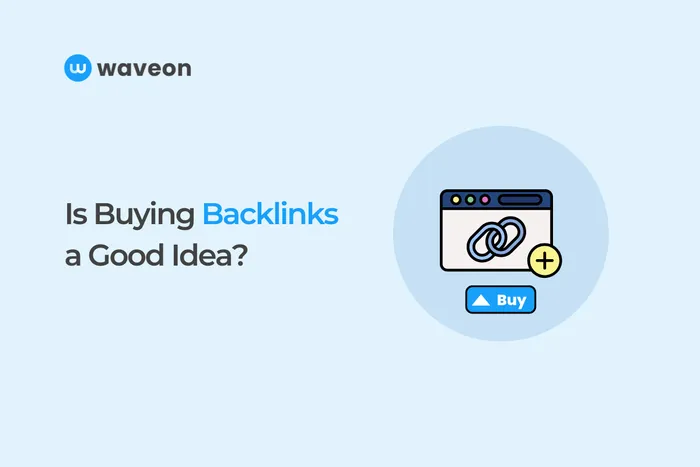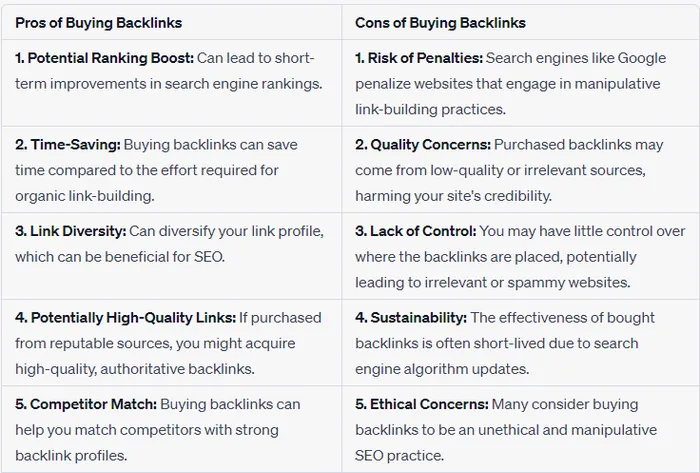Marketing
Is Buying Backlinks a Good Idea? Debating the Effectiveness and Ethics
Waveon Team
2023.07.20.
0 min read
TABLE OF CONTENTS

Introduction
Backlinks play a vital role in search engine optimization (SEO), influencing website visibility and organic traffic. As businesses strive to improve their search rankings, the practice of buying backlinks has emerged.
However, the effectiveness and ethics of buying backlinks remain a subject of debate. In this article, we delve into the pros and cons of buying backlinks, examine its impact on SEO performance, and discuss the ethical considerations associated with this practice.
Understanding Backlinks:
Backlinks are links from external websites that point to a specific webpage. They are crucial in determining a website's authority and relevance to search engines. Backlinks can be categorized as natural (earned through organic means), earned (acquired through quality content and outreach), or purchased (obtained by paying for links).

Pros of Buying Backlinks:
- Faster Acquisition: Buying backlinks offers a shortcut to acquiring links without investing extensive time and effort in outreach campaigns.
- Potential for Improved Visibility: Purchasing backlinks from reputable sources may lead to improved search rankings and increased visibility.
- Referral Traffic and Exposure: Some purchased backlinks may generate referral traffic from the linking website, exposing the target website to a new audience.
- Link Diversity: It can help diversify your link profile, which, in some cases, can be beneficial for SEO. Search engines tend to favor websites with a diverse range of high-quality backlinks.
Cons of Buying Backlinks:
- Risk of Low-Quality Backlink: Buying backlinks increases the chances of obtaining low-quality and spammy links, which can harm SEO efforts and brand reputation.
- Penalties from Search Engines: Search engines, like Google, discourage the manipulation of search rankings through purchased backlinks. Violating their guidelines can result in penalties and a significant drop in rankings.
- Lack of Genuine Engagement: Purchased backlinks often lack genuine engagement and do not necessarily indicate endorsement or trust from the linking website's audience.
Impact of Backlinks on SEO Performance:
Backlinks, also known as inbound or incoming links, play a significant role in the SEO (Search Engine Optimization) performance of a website. They can have both positive and negative impacts, depending on various factors. Here's how backlinks can affect SEO performance:
Positive Impact on SEO Performance:
Improved Search Engine Rankings: High-quality backlinks from authoritative and relevant websites can boost a website's search engine rankings. Search engines like Google consider backlinks as a signal of trust and authority. When reputable sites link to your content, it can increase your site's credibility in the eyes of search engines.
Increased Organic Traffic: Higher search engine rankings result in increased organic (non-paid) traffic to your website. When your web pages rank higher in search results, more users are likely to click on your links, leading to greater visibility and traffic.
Enhanced Domain Authority: Domain authority is a metric that reflects a website's credibility and trustworthiness in the eyes of search engines. Backlinks from authoritative sites can contribute to a higher domain authority, which can positively impact your site's overall SEO performance.
Better Indexing and Crawling: Search engine bots use backlinks to discover and index new web pages. Quality backlinks can help ensure that your site's content gets crawled and indexed more efficiently, improving its overall visibility in search results.
Keyword Ranking: Backlinks can influence the ranking of specific keywords or phrases. If you have relevant backlinks pointing to pages optimized for specific keywords, it can help those pages rank higher in search results for those keywords.
Negative Impact on SEO Performance:
Low-Quality Backlinks: Backlinks from low-quality, spammy, or irrelevant websites can harm your SEO performance. Search engines may view these links as manipulative and may penalize your site by lowering its rankings.
Over-Optimization: If you engage in over-optimized link-building practices, such as excessive use of exact-match anchor text or acquiring too many backlinks too quickly, it can raise red flags with search engines and lead to penalties.
Broken or Toxic Links: Links that point to broken or toxic (harmful) websites can negatively affect your site's credibility. Regularly monitor your backlink profile and disavow or remove any harmful links.
Unnatural Patterns: Search engines are adept at detecting unnatural link-building patterns. If your backlink profile appears artificial or manipulated, it can result in penalties.
Competitor Backlinks: If your competitors have significantly better backlink profiles, it can be challenging to outrank them. Competitor analysis can help you identify areas for improvement.
Ethical Considerations:
The ethics of buying backlinks is a contentious topic. Search engines like Google consider it a violation of their guidelines and view it as an attempt to manipulate search results. Building a reputable online presence and earning backlinks organically aligns with long-term ethical SEO practices.
Risk of Penalties: Search engines like Google have strict guidelines against manipulating search results through practices like buying backlinks. If you're caught buying or using low-quality, spammy backlinks, your website could face penalties, including being removed from search results.
Quality vs. Quantity: It's about more than just having a lot of backlinks; the quality of those links matters. Buying backlinks often results in low-quality links from irrelevant or spammy websites, harming your site's reputation.
Lack of Control: When you buy backlinks, you often have little control over where those links will be placed. They might end up on websites with content that aligns differently with your brand or audience.
Sustainability: The effectiveness of bought backlinks is often short-lived. Search engines continually update their algorithms to detect and penalize unnatural link-building practices. This means that any gains you achieve might be temporary.
Reputation: Ethical concerns aside, buying backlinks can damage your website's reputation, both in the eyes of search engines and potential visitors. Trust and credibility are essential in the online world.
Alternatives to Buying Backlinks:
Instead of resorting to purchasing backlinks, businesses can focus on alternative strategies:
Organic Link Building: Focus on creating high-quality, valuable content that naturally attracts backlinks from authoritative websites. This is a time-consuming but sustainable approach to SEO.
Outreach and Relationships: Build relationships with other websites and engage in outreach efforts. Guest posting on relevant, high-quality websites can earn you valuable backlinks.
Content Marketing: Invest in content marketing strategies that create and promote valuable content. This can attract organic backlinks over time.
Local SEO: If you have a local business, focus on optimizing your website for local search results and obtaining backlinks from local directories and reputable local businesses.
Best Practices for Backlink Acquisition:
To ensure the effectiveness and ethicality of backlink acquisition, businesses should follow these best practices:
Emphasize Organic Backlinks: Prioritize organic backlinks acquired through valuable content and genuine engagement.
Research and Due Diligence: Conduct thorough research and due diligence before considering purchasing backlinks to avoid low-quality sources.
Quality Over Quantity: Focus on acquiring backlinks from authoritative and relevant sources rather than a high volume of low-quality links.
Conclusion
The decision to buy backlinks is complex, involving considerations of effectiveness and ethics. While buying backlinks may offer short-term benefits, the long-term success of SEO lies in organic backlinks and high-quality content.
Businesses should prioritize ethical SEO practices, invest in relationship building, and focus on creating valuable content to attract natural backlinks. By adopting these approaches, companies can build a sustainable online presence and drive long-term SEO success.












